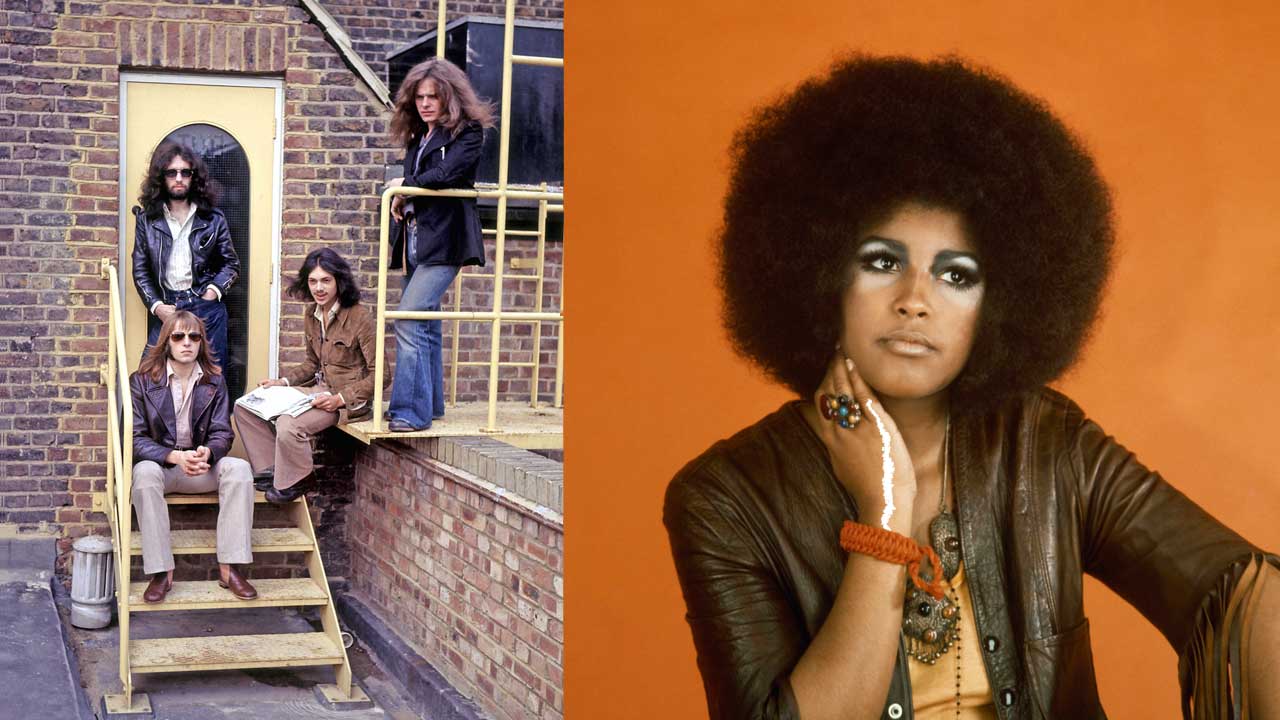This is how it happens. A young man barely turned 20 bumps into a more worldly woman and makes eye contact. There’s a conversation, an exchange of numbers. A clash of flesh. Stroll on. Free wheeling.
London. May 1970. Looks like a hot one. The city heaves – a new decade. There’s something in the air. Enter Paul Rodgers of the bluesy rock foursome Free. He’s hitchhiked into town after a few so-so concerts up North, and the van broke down on the M1. The new motorway.
Still wearing his sweaty denim stage gear Rodgers drops off at Marble Arch and he’s wandering down Oxford Street when he gets to the junction of Baker Street and sees her. Words are exchanged. Rodgers wanders away with a smile on his face and a nagging line in his head… All right now baby, it’s all right now.
“It was serendipity,” Rodgers recalls. “A beautiful woman in the sunlight. Just a vision with the light shining through her dress. She was a very dark lady. A famous actress. I can’t tell you who. To me it was all about – what would happen, if only I had the nerve. Because, oh my God, she is so lovely. So… I had the chorus after 20 yards, and the melody starting to form. The chords lined up in a natural progression. I was waiting for the rest of the guys to pick me up and by the time I got in the van I was nearly there. I wrote it from the chorus backwards.”
Controversy has dogged the writing of the song ever since. Andy Fraser reckoned he started singing the title in the dressing room after a disastrous gig in Hull to cheer every one up: “It was [drummer] Simon [Kirke]’s phrase but I started doing it and everyone started joining in.” For his part, Kirke remembers it as after a gig in Durham where “Andy said, ‘We need an up-tempo number’. I think he and Rodgers had something cooking because he turned to him and said, ‘How about that ones that goes…’ [and] started singing the words ‘all right now’”.
Either way, the song is credited to Rodgers/Fraser and the success of All Right Now turned Free from a British blues boom band into a household name. Why? “People related to the song immediately,” Rodgers says. “The set up is great, and the narrative takes you straight in – a godsend for a writer. Plus the story gives you a smile because it flows. It’s a normal emotion, but one you don’t experience every day.”
Free’s debut album Tons Of Sobs was an instant underground hit. So was their selftitled second album. The John Lee Hooker inspired I’ll Be Creeping was heavily played by pirate radio DJs. They were studied. Aside from Rodgers, they included teenage guitar prodigy Paul Kossoff. The rhythm section was photogenic bass boy Andy Fraser and razor fast drummer Simon Kirke.
Free set their bar high. During their winter tour of 1970 they closed shows with Booker T & The MG’s The Hunter, reasoning their own tunes weren’t good enough to rival the authentic old folks. “Our gigs excited us” Rodgers recalls “but we lacked something. We did a show in Stockton, near my home town, and there weren’t many in . I gave the rest of the band a severe pep talk. They’re going ‘no one’s listening, so who cares Paul?’ and I’m replying ‘it matters because I’m listening.’ They went ‘durrr, all right then.’"
Rodgers was proven right. “The next time we went to Stockton and Durham the halls were heaving, I mean it was hanging from the rafters packed.”
It’s fashionable to review the very early seventies as a waiting room – like nothing was going on. Anyone alive then would know that to be absurd. 1970 was the best time to be 15 years old. All Right Now was released against a background of amazing music. Singles like Steam’s Na Na Hey Hey Kiss Him Goodbye, Bob and Marcia’s Young, Gifted And Black, Norman Greenbaum’s Spirit In The Sky, and Fleetwood Mac’s epic Green Manalishi.
And the albums – Van Morrison’s Moondance, The Doors’ Morrison Hotel, Creedence Clearwater Revival’s Willy And The Poor Boys. But none of this stiff competition concerned Rodgers. “The song just blew the doors off. We opened with it and people were dancing. Then they requested it. It became incredible. By the time we got to London we were stretching it to a soul jam – Otis Redding and James Brown. We were just white boys trying to do our best.”
Once All Right Now gatecrashed the Top Five, Free’s fanbase exploded. “It was a good pulling song. It was raunchy and suggestive and they were gaggin’ for it. Nah! I was so shy round women then I never took full advantage. There was sexual wish fulfilment, and the deep and meaningful way.”
Free had other great singles to come – Wishing Well, My Brother Jake, A Little Bit Of Love, and that dark rogue The Stealer. “All good songs but All Right Now wins out because it’s a brand new song every time you hear it,” says Paul. “Besides, boy meets girl is such a rich vein. Love ain’t gonna go away.”
The song was soon iconic. Eric Clapton astounded guitarist Paul Kossoff one day in June. “He asked me how I got my tremolo effect” Kossoff would recall. “I thought fuck off, you must be joking. You must be taking the piss mate. I believed he was. But he wasn’t.”
Rodgers maintains that Kossoff’s downfall was his lack of confidence. “He had that rich Les Paul sound but he always said, ‘Oh Paul, I can’t do that million chords a minute thing, I can’t play like Clapton.’ He didn’t need to. Blues guys know that the purpose is to deliver an emotional message with minimal fuss.”
So Koss nailed the musical conversation on All Right Now. “It was question and answer. Like when you pass a ball to each other. And he was tasteful. Such a waste.” It was a waste. From 1970 Kossoff developed a heroin addiction. Like Nick Drake he was dreaming and doomed. Yet he was inspirational. Rodgers wrote Wishing Well for Kossoff after another ‘Free to split’ furore in 1972. The elliptical chorus told it straight: ‘You’ve always been a good friend of mine/But you’re always saying farewell/And the only time when you’re satisfied/Is with your feet in the wishing well.’
On a brighter note All Right Now has served Rodgers well. “I never bought a yacht on the Riviera off it, but it’s been very handy. A couple of TV ads butchered it like the Wrigley’s Spearmint gum thing, where they just used my voice. Island Records did better than we did. The song broke us in America but we couldn’t capitalise because we broke up and became an enigma there."
Hardly a millstone, All Right Now hasn’t always featured in Rodgers’ set. “When I left Free and formed Bad Company, from 1973 until 1992 I steered away from it altogether, didn’t play it once. Then in 1992 I was playing in a New York club with Jason Bonham and he set me up. He kept on shouting it at the audience and they responded. Eventually I’m the only person in the room saying ‘No, I won’t do it! Oh, OK. Fuck it then!”
Of course, he sang it as frontman of Queen. “Brian May loves to play the song. At Nelson Mandela’s 90th Birthday concert in Hyde Park we did it and everyone went nuts. Brian just tore it off. He was so close to Koss in his solo it brought a tear to my eye.”
As for the actress who walked across Baker Street and straight into legend, Paul Rodgers isn’t telling. He’s obviously forgotten that he told Classic Rock writer and Free biographer Steven Rosen a couple of decades ago. “I’ve never really said this before,” he told Rosen, “[but] I do remember the girl from Hair who went out with Mick Jagger. What was her name?”
Her name is Marsha Hunt: former girlfriend to Marc Bolan, bearer of Mick Jagger’s first child, and a woman who claims to be the inspiration for another classic, the Rolling Stones' Brown Sugar. “I used to live near Oxford Street and Hair was playing right there on the corner. And I remember seeing this girl and she may have triggered the idea for that, because there she stood in the street, and she seemed to be smiling from her head to her feet. She obviously had a presence, do you know what I mean? Because there were a lot of people around and she just stood there and I thought, ‘Wow – look at her’.”
Today, though, Rodgers is tight-lipped. He’s saving her for his book, he says. He won’t have to look very far for a title.
Paul Rodgers' upcoming album Midnight Rose is due for release in September. This feature originally appeared in Classic Rock 123, in September 2008.

